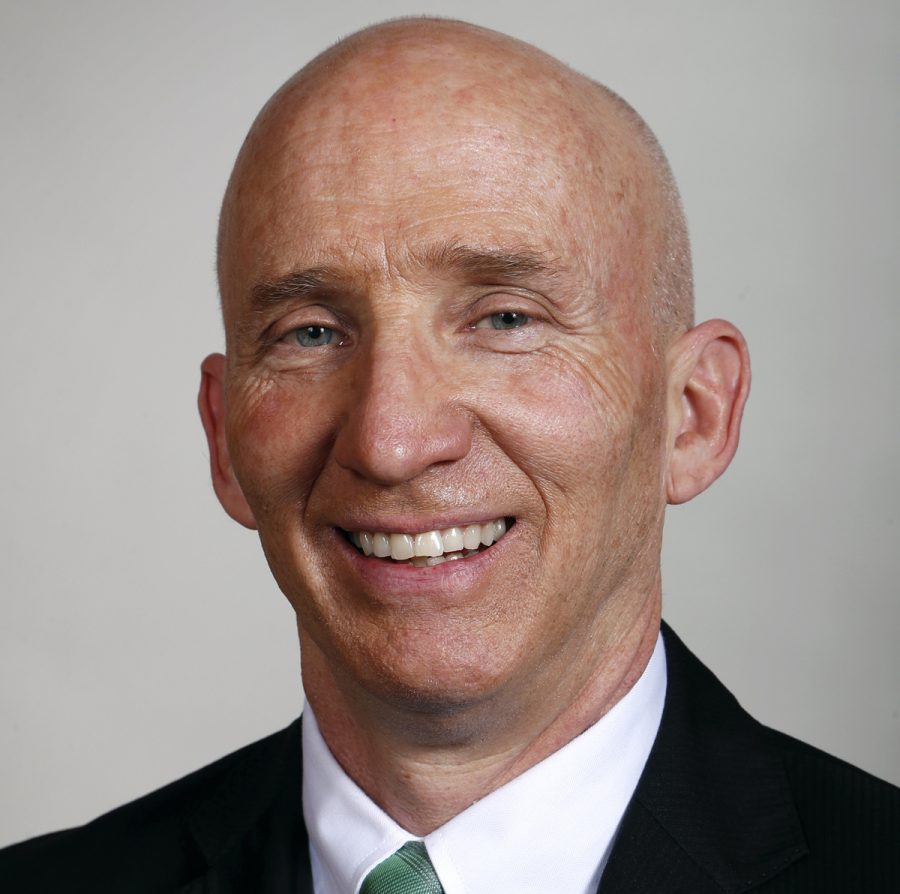UNI prof pens letter opposing ‘biblical literacy’ bill
Kenneth Atkinson, a professor of history at UNI, co-authored a letter to Iowa State Representative Walt Rogers (pictured above) regarding House File 2031, which aims to enhance biblical literacy in public schools.
Feb 19, 2018
Editor’s note: the following letter was originally addressed to Iowa State Representative Walt Rogers on Jan. 23, 2018. It appears here in its original form, as requested by co-author Kenneth Atkinson, a professor of history at UNI.
As professors of biblical studies at the regent universities of Iowa, we have experience teaching courses on the Bible. We have developed methods to educate students about this complex set of books in a religiously pluralistic society.
House File 2031 intends to “adopt rules establishing course standards for elective social studies courses” to enhance biblical literacy. It is not a bipartisan bill. It is a bill sponsored by, among other legislators, Skyler Wheeler, who has been a strong proponent of allowing public schools to teach alternatives to evolution.
In particular, the proposed bill aims “to provide students with knowledge of biblical content, characters, poetry and narratives that are prerequisites to understanding contemporary society and culture, including but not limited to literature, art, music, mores, oratory and public policy.”
Although the language of the bill seems to advocate neutrality, the fact is that it opens the door for teachers, most of whom have little or no training in academic biblical studies, to impose their personal religious opinions about the Bible upon students.
For example, The Des Moines Register quotes state senator Brad Zaun (R-Urbandale), who supports the bill, as follows: “Today, we are raising generations of children ignorant of the origin of core American values that should unite us, such as the historically radical, but biblically inspired ideal that all people have inherent worth and equality and are ‘endowed by their creator with certain unalienable rights.’”
Opinions such as these show that value judgements and theological opinions are being offered as objective historical facts about the Bible, often in direct opposition to what the Bible actually says. Too often, a uniformly benign view of the Bible and its cultural benefits is presented as obvious to everyone.
The fact is that biblical authors and Christians throughout history have held widely divergent opinions on what any “inherent worth” or “equality” meant.
Historically, the Bible has been used to support slavery as well as abolition. Some biblical authors supported genocide and the destruction of other religions, while others supported inclusivity and peace. The Bible has been used to support gender and race discrimination, as well as gender and race equality.
The Amana Colonies in Iowa once used the Bible to support a communistic lifestyle, while many modern Christians believe the Bible has always supported some form of capitalism.
Likewise, believers in other religions may not see the Bible in the same way. Many Native Americans attribute the destruction of their cultures to people who based their policies on the Bible. Many non-Christians may dispute that anything that might be called biblical “civilization” was beneficial to them.
Without additional training and any regular and strict peer evaluation of high school or elementary school teachers by academic biblical scholars, the implementation of any standards will be largely unenforceable.
Teachers may be encouraged or unrestrained in offering theological and subjective opinions such as those displayed by the state senator who supports this bill.
In the past, we have witnessed the controversies ignited by certain politicians insisting that non-scientific origins of the universe be taught alongside evolution in our science classrooms.
Can you imagine what will happen in our public classrooms when parents across Iowa —every Catholic, Baptist, Methodist, Presbyterian, Lutheran, Church of Christ, Greek Orthodox, Armenian Orthodox, Evangelical Free, Seventh-Day Adventist, Mormon and Unitarian, not to mention Reform Jewish, Sunni Muslim, Theravada Buddhist, Secular Humanist and atheist —want their say on how the Bible ought to be taught in our classroom?
Furthermore, this bill does not even define what Bible will be taught in the public classrooms. Will this bill teach the Catholic Bible, with its books like 1 Maccabees and Sirach?
Or, will it teach the Protestant Christian Bible that does not teach these books to be part of the Christian canon? The mere question of which Christian Bible will be taught in public classrooms necessarily requires sectarian theological judgments be made before we even read a single word.
This is why our Nation’s Founders, despite many of them being Christians, decided not to adopt Christianity as the state religion, nor require the Christian Bible be learned by schoolchildren as required reading, and instead left this responsibility to parents at home.
Given the pluralistic religious society in which we live, we ask legislators to leave the teaching of courses on Jewish and Christian scriptures to trained professionals, who understand the enormous complexity that lies behind the origin and subsequent use of what are called “scriptures.”
Sincerely,
Dr. Hector Avalos
Professor of Religious Studies, Iowa State University
Dr. Kenneth Atkinson
Professor of History, University of Northern Iowa
Dr. Robert R. Cargill
Asst. Professor of Classics and Religious Studies, University of Iowa, and Editor, Biblical Archaeology Review








